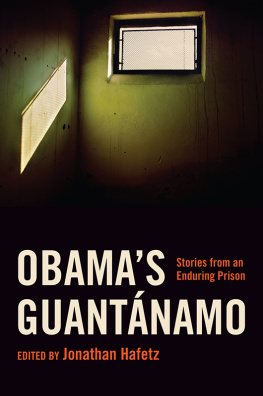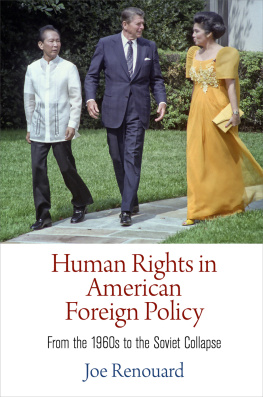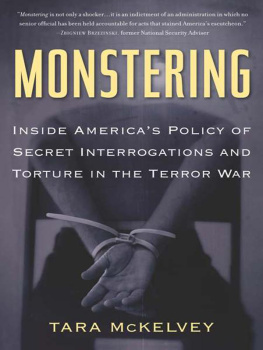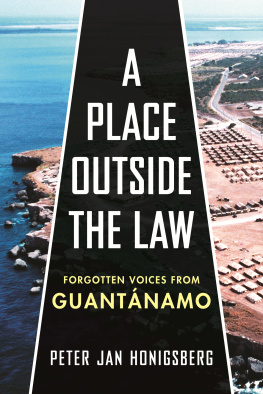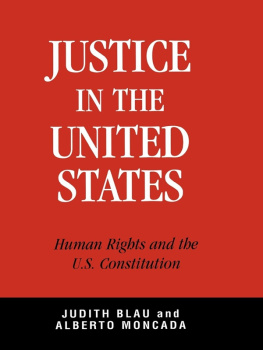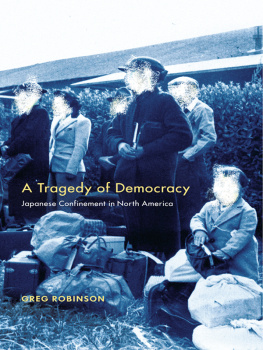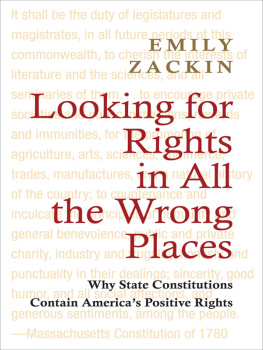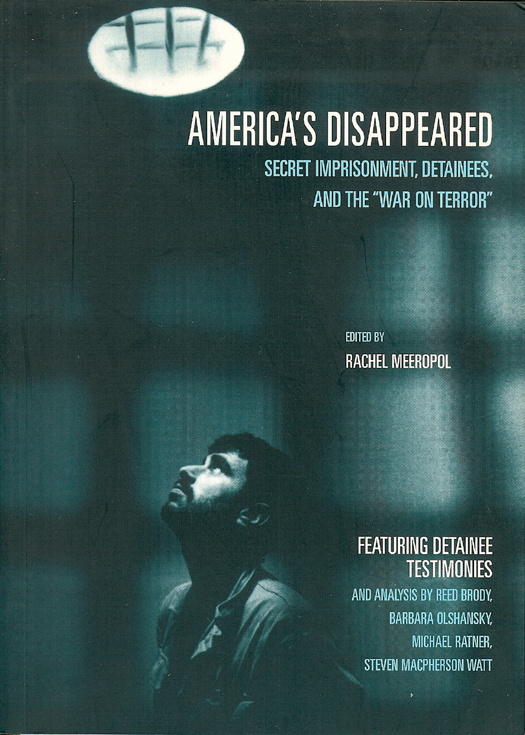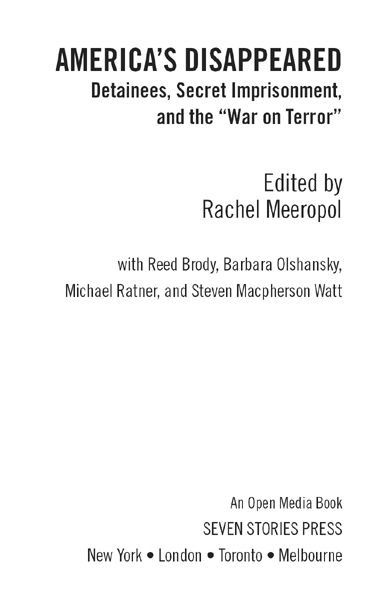Copyright 2005 by Center for Constitutional Rights and Human Rights Watch
A Seven Stories Press First Edition
Open Media Series Editor: Greg Ruggiero
All rights reserved. No part of this book may be reproduced, stored in a retrieval system, or transmitted in any form, by any means, including mechanical, electric, photocopying, recording or otherwise, without the prior written permission of the publisher.
Seven Stories Press
140 Watts Street
New York, NY 10013
www.sevenstories.com
In Canada:
Publishers Group Canada, 250A Carlton Street, Toronto, ON M5A-2L1
In the UK:
Turnaround Publisher Services Ltd., Unit 3, Olympia Trading Estate, Coburg Road, Wood Green, London N22 6TZ
In Australia:
Palgrave Macmillan, 627 Chapel Street, South Yarra VIC 3141
Library of Congress Cataloging-in-Publication Data
Americas disappeared : detainees, secret imprisonment, and the War on Terror / edited by Rachel Meeropol, with Reed Brody [et al.]. 1st ed.
p. cm. (An open media book)
eISBN: 978-1-60980-159-5
1. Political prisonersUnited States. 2. MuslimsLegal status, laws, etc.United States. 3. MuslimsCivil rightsUnited States. 4. Arab AmericansLegal status, laws, etc. 5. Arab AmericansCivil rights. 6. War on Terrorism, 2001 Social aspects. 7. War on Terrorism, 2001 Political aspects. 8. War on terrorism, 2001 United States. I. Meeropol, Rachel. II. Brody, Reed, 1953- III. Series.
HV9471.A484 2004
973.931dc22 2004028028
College professors may order examination copies of Seven Stories Press titles for a free six-month trial period. To order, visit www.sevenstories.com/textbook, or fax on school letterhead to (212) 226-1411.
Cover design by Greg Ruggiero
Cover image by Micha Bar Am/Magnum Photos
v3.1
Contents
Introduction
RACHEL MEEROPOL
1. Open Letter to President George W. Bush from Two Former Detainees
SHAFIQ RASUL AND ASIF IQBAL
2. The Guantnamo Prisoners
MICHAEL RATNER
3. Statement
MAHER ARAR
4. Torture, Stress and Duress, and Rendition as Counterterrorism Tools
STEVEN MACPHERSON WATT
5. The Road to Abu Ghraib
REED BRODY
6. Statement
KENNETH SCOTT
7. Looking for Hope: Life as an Immigration Detainee
PHILLIP MARCUS
8. Statement
HEMNAUTH MOHABIR
9. The Post-9/11 Terrorism Investigation and Immigration Detention
RACHEL MEEROPOL
10. Statement
MOHAMED MADDY
11. What Does It Mean To Be An Enemy Combatant?
BARBARA OLSHANSKY
Dedicated to the memory of Farouk Abdel-Muhti and to the millions of others who remain locked down behind prison walls, on strike in immigration centers and shackled in wire cages. If you keep fighting, so will we.
Acknowledgments
FIRST AND FOREMOST , we wish to thank all our colleagues at the Center for Constitutional Rights for the incredible work that they have done on the cases described in this book, and their tireless efforts to safeguard the Constitution in the wake of the September 11 attacks. Special thanks to Marc Krupanski, for spending hours editing and adding to this manuscript, to Jen Nessel and Bob Osborne for their guidance through its production, Greg Ruggiero and the staff at Seven Stories Press for initiating this project and for their skillful and meticulous final edits, and to Jeff Fogel and Ron Daniels for their steadfast leadership in such a pivotal period.
Thanks also to the individual activists, attorneys, university professors, journalists, law firms, and other international and nonprofit organizations, with whom we have worked over the past three years: Amnesty International, Human Rights Watch, Columbia University Human Rights Clinic, Desis Rising Up and Moving, Coney Island Avenue Project, Families for Freedom, ACLU, Immigrant Defense Project, New Immigrant Community Empowerment, American Friends Support Center, Islamic Council of North America, American-Arab Anti-discrimination Center, Asian American Legal Defense and Education Fund, Northern Manhattan Coalition for Immigrant Rights, Coalition for the Human Rights of Immigrants, Immigrant Justice Solidarity Project, Human Rights First, Immigration Equality, CAAAV: Organizing Asian Communities, Nodutdolfor Korean Community Development, Quilombo NYC, Committee for the Release of Farouk Abdel-Muhti, New Jersey Civil Rights Defense Committee, Stop the Disappearances Campaign, and many others. It has been a privilege to work with you all and without your support and collaboration, our goal of preserving our civil and human rights in the postSeptember 11 era would be a whole lot more difficult.
We should also like to extend thanks to our clients, Shafiq Rasul, Asif Iqbal, Rhuel Ahmed, and the families of other detainees who remain in limbo at Guantnamo Bay, to Maher Arar and his wife and children, and to Ibrahim Turkmen, Shakir Baloch, Asif-Ur-Rehman Safi, Syed Amjah Ali Jaffri, Yasser Ebrahim, Hany Ibrahim, Akil Schedveda, Kenneth Scott, Philip Marcus, Hemnauth Mohabir, and Mohamed Maddy, who lived through hellish conditions at MDC and Passaic and came out the other side; your courage to stand up and tell the world what happened to you, and to expose the human toll of these oppressive policies, is a constant source of inspiration to all of us at CCR.
Introduction
RACHEL MEEROPOL
I FIRST MET FAROUK ABDEL-MUHTI on February 5, 2003 in a dingy visiting cubicle at Passaic County Jail in Paterson, New Jersey. At that point, he had already spent ten months in immigration detention. He was arrested in April of 2002 on a seven-year-old deportation order as part of the increasingly aggressive and targeted enforcement of civil immigration laws in the wake of 9/11. Farouk was a stateless Palestinian; he was born in Ramallah in 1947 and moved to New York in the seventies. The FBI and the INS had nowhere to send him, so like so many other immigration detainees without a home country, Farouk was simply placed in detention.
In many ways, Farouks story follows that of the other post-9/11 detainees chronicled in this book. He was kept in the same overcrowded and brutal jails and faced the same physical and verbal abuse as was documented on video and in a report by the Office of the Inspector General. Like other post-9/11 detainees, Farouk was beaten repeatedly, harassed by guards, and constantly moved between facilities in New York, New Jersey, and Pennsylvania. In other ways, he was different from many other prisonersshortly after I met with him, he was put in solitary confinement for eight continuous months in an attempt to prevent him from organizing other detainees against their detention and its brutal conditions. Even within these extremely restrictive surroundings, he still managed to educate and organize detainees and guards about social justice issuessuch as reasons to oppose the U.S. war on Iraq.
Farouk was also different than most of the other noncitizens swept up in the U.S. governments aggressive post-9/11 policing in that he was eventually released and permitted to stay in the United States. In 2001, the Supreme Court ruled that if after six months in detention it is unlikely the government will successfully deport a person, that person must be released. In April of 2004, upon the orders of a federal court judge relying on that precedent, the Department of Homeland Securitys Bureau of Immigration and Customs Enforcement (ICE) finally released Farouk.


